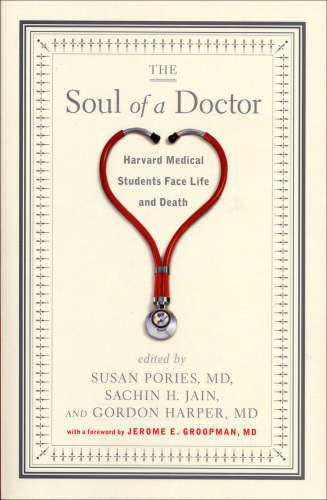
The Soul of a Doctor
Harvard Medical Students Face Life and Death
دانشجویان پزشکی هاروارد با زندگی و مرگ رو به رو هستند
فرمت کتاب
ebook
تاریخ انتشار
2012
نویسنده
Fareed Zakariaنویسنده
Renée Raudmanنویسنده
Fareed Zakariaنویسنده
Renée Raudmanنویسنده
Jerome E. Groopmanناشر
Workman Publishingشابک
9781616202279
کتاب های مرتبط
- اطلاعات
- نقد و بررسی
- دیدگاه کاربران
نقد و بررسی

March 27, 2006
As Groopman states in his foreword, "each interaction between a doctor and a patient is a story." The moving stories of 44 doctors-in-training collected by two M.D.s (Pories and Harper) and one medical student (Jain), all at Harvard, are accounts written by medical students. Their tales convey lessons both emotional and medical, from learning how to communicate and empathize with those afflicted by illness to ways to ease suffering and loss. In one heartrending incident, David Y. Hwang describes a marine's rage followed by tears on hearing that his wife was going to die, while the wife herself remains in calm denial. Rajesh G. Shah explores how he learned from his first patient to overcome his judgmental attitude about those so beset by anxiety they cannot function without medication. In a particularly self-revelatory (and anonymous) piece, a student describes the endless hazing experience at the hands of interns and residents and the student's need to constantly manage a sense of insecurity. These are thoughtful and illuminating accounts of beginning physicians under stress, growing and changing as they progress through their chosen field.

April 15, 2006
Breast cancer surgeon Pories, Harvard medical student Sachin H. Jain, and child and adolescent psychiatrist Gordon Harper have compiled approximately 50 firsthand student accounts born from a patient-doctor course at Harvard Medical School taught by Pories. Averaging several pages, these essays are startlingly well written, and if a few of them are occasionally a little maudlin or trite, the authors' sincerity is authentic. The essays are grouped into four sections: -Communication, - -Empathy, - -Easing Suffering and Loss, - and -Finding a Better Way. - Some describe a patient's family or a hospital colleague, while others focus on students' private lives. Joe Wright addresses the often difficult task of interviewing a patient; Mike Westerhaus offers a meta-analysis of the art of listening. There is no excessive use of medical terminology, and less-common words are explained in parentheses, which makes these essays entirely accessible to general readers. Academic and medical school libraries will want to purchase this book, and its low price, emotional impact, and 21st-century perspective will make it a desirable purchase for public libraries as well." -Martha E. Stone, Massachusetts General Hosp. Lib., Boston"
Copyright 2006 Library Journal, LLC Used with permission.

July 1, 2006
Adult/High School -This collection of essays written by medical students going from the classroom to their first experiences with live patients gives personal views of the issues doctors face. From communicating diagnoses to patients to balancing medical protocol with patient needs, medical students have a unique perspective. They see established procedures with new eyes and question everything. Each essay conveys a pivotal moment or experience for its author. One individual learning to take medical histories watched a video of himself interacting with patients and realized that he never looked up and was brusque to the point of rudeness. Teens exploring medical careers will find much to think about here." -Charlotte Bradshaw, San Mateo County Library, CA"
Copyright 2006 School Library Journal, LLC Used with permission.

May 1, 2006
Medical schooling's decades-long focus on the science rather than the art of doctoring seems to be shifting. Doctors and their teachers are again recognizing that there is more to patient care than pages of numbers and medical images. The change isn't proceeding rapidly, though; indeed, one of the med-student contributors to this book notes being told, "The patient's history is totally worthless." The good news is that medical schools are beginning to adjust. In Harvard's patient-doctor course, students are required not only to work on the wards but also to write essays about their experiences. The results may be as surprising to them as it is sadly predictable to many patients. After viewing himself in a videotaped interview with a patient, one young man estimated that it had taken him only months to go from being "Mr. Empathy" to being "Dr. Jerk." One can almost hear the idea bulbs ignite as these students wrestle with issues of communication, empathy, and easing suffering and loss.(Reprinted with permission of Booklist, copyright 2006, American Library Association.)

























دیدگاه کاربران